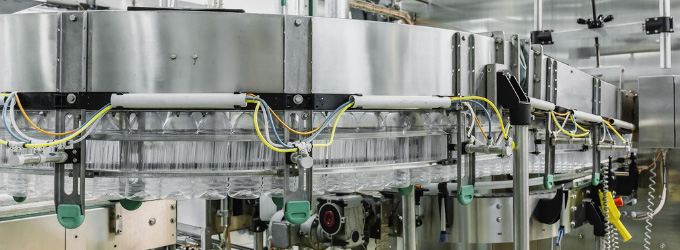
Food Safety Strategy: The Bright Future of Frozen Food Production
October 29, 2024The frozen food industry has undergone a remarkable transformation in recent years, driven by changing consumer preferences and advances in technology. With a growing focus on health, sustainability, and innovation, frozen food production is emerging as a crucial player in the global food landscape. Modern frozen food production, and its ever-expanding technology, has an innovative road ahead, with essentially limitless potential to lead the food production industry toward a sustainable and more secure food system in the immediate future.
Changing Consumer Preferences and Food Safety Expectations
Today’s consumers are more health-conscious than ever, demanding clean labels and transparent sourcing in their food products. This shift presents both challenges and opportunities for frozen food producers. To meet these expectations, companies must innovate their freezing techniques and utilize natural preservatives that are safe and sustainable.
Health-conscious choices extend beyond ingredients to encompass sustainable practices. Consumers are increasingly demanding eco-friendly packaging and production methods. Food manufacturers have the opportunity to adopt sustainable practices that not only maintain high safety standards but also reduce environmental impact.
Frozen Food’s Role in Reducing Food Waste
One of the most significant advantages of frozen food is its ability to combat food waste. With an extended shelf life compared to fresh produce, frozen foods help reduce spoilage and waste throughout the supply chain. By aligning with global goals of reducing food loss, frozen food production supports a more sustainable food system.
Rapid chilling and freezing technologies are pivotal in this effort, preserving produce at peak freshness and minimizing post-harvest losses. By freezing surplus products immediately, manufacturers can ensure that food items remain safe and available for future use, thereby reducing waste and supporting food security.
Regulatory Changes and Global Standards for Frozen Food
The global nature of the world food market requires producers to adhere to diverse regulatory changes and global standards. As international trade continues to expand, companies must remain agile in adapting to evolving food safety regulations across different countries. This necessitates state-of-the-art safety protocols, including advanced sanitation and temperature control measures, to prevent pathogens and ensure compliance.
Keeping up with these changes is critical for frozen food producers to maintain their competitive edge and ensure product safety in an increasingly regulated market.
Frozen Food as a Driver for Food Security
Frozen food plays a vital role in addressing global food insecurity by offering a practical solution for preserving nutrients and extending shelf life. This capability makes such products essential for feeding populations in regions with limited access to fresh produce. By fortifying frozen foods with essential vitamins and minerals, manufacturers can help improve public health and customer satisfaction, especially in areas where nutritional deficiencies are prevalent.
Technologies like tunnel freezing and spiral freezing eliminate the need for chemical preservatives, aligning with consumer preferences for clean labels and additive-free foods. This makes frozen food a key component in global food security strategies.
Adaptability to a Wide Range of Foods
From vegetables and fruits to meats, seafood, and ready-to-eat meals, rapid freezing technologies offer immense adaptability. This versatility enables manufacturers to diversify their product lines, catering to the growing demand for variety in frozen foods. Additionally, rapid freezing can reduce the need for temperature-controlled transportation, thus decreasing greenhouse gas emissions and contributing to environmental goals.
Supporting Innovation and New Product Development
The frozen food industry is experiencing a renaissance in innovation, with rapid freezing technology enabling the development of gourmet and artisanal products. These products rival fresh foods in flavor, texture, and nutritional value, fueling the growth of frozen food markets worldwide.
Rapid refrigeration technologies are integral to this innovation, ensuring that frozen foods remain safe, high-quality, and ready to meet rising consumer demand.
Meeting Rising Global Demand for Safe and Fresh Food
The global population is growing, particularly in urban areas where the demand for accessible, safe, and fresh food is increasing. Rapid refrigeration allows food producers to extend the shelf life of perishable items, ensuring they remain safe from production to consumption. This is particularly important in densely populated regions with complex food supply chains.
Advanced refrigeration technologies enable the safe transport of fresh produce, dairy, seafood, and meats across continents, reducing spoilage and supporting global distribution. By preserving more of their harvest, food producers can reduce food loss and support food security in regions with inadequate refrigeration infrastructure.
The Bright Future of Frozen Food Production
The bright future of frozen food production lies in its ability to deliver safe, high-quality, and sustainable food options to consumers worldwide. By leveraging rapid refrigeration technologies, the industry can meet the growing demand for fresh, frozen, and processed foods while supporting global food security and sustainability goals.
At Advanced Food Equipment LLC, we are committed to providing state-of-the-art rapid cooling and freezing systems designed to meet the diverse needs of the food industry. Whether you are freezing fruits, vegetables, seafood, meat, or bakery products, our solutions ensure optimal results.
Join us in shaping the future of frozen food production. Contact us today to collaborate on developing your food production strategy and discover the durability and craftsmanship of AFE products. Together, we can build a sustainable and secure food system for generations to come.
Contact us to work with you in developing your food production strategy today!